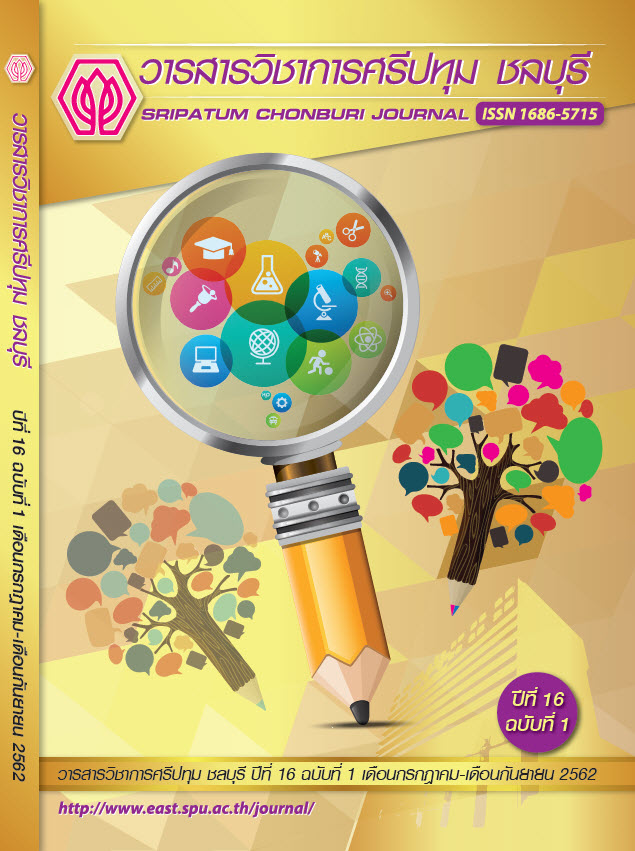UNDERGRADUATE STUDENTS’ PERCEPTIONS IN FACULTY OF INDUSTRIAL EDUCATION AND TECHNOLOGY AT KING MONGKUT’S UNIVERSITY OF TECHNOLOGY THONBURI TOWARD TEACHING AND LEARNING IN THAILAND 4.0 ERA
Keywords:
perception, teaching management, Thailand 4.0, KMUTTAbstract
The purpose of this research was to study the comparison of personal factors on perceptions and to study the suggestions of students’ perceptions in Faculty of Industrial Education and Technology at King Mongkut’s University of Technology Thonburi (KMUTT) towards teaching and learning in Thailand 4.0 Era. The sampled group of this research is the undergraduate students of industrial education and technology at KMUTT in term 1/2018. The researcher collected the data by using quota sampling. In this survey, the researcher had a great response rate. This was conducted by using a questionnaire to collect data using 176 samples. Data were analyzed by frequency, percentage, median, and standard deviation-testing the value (t-test) and one-way ANOVA (Analysis of Variance).
According to the results, the number of respondents were mostly female 54.19% (97 respondents). Besides, 46.93% (84 respondents) of them were at an average age ranging from 18 to 19 years old. Also, 40.22% (42 respondents) of the respondents were first-year students.
The overall perception of Bachelor’s degree students was at a high level. When considering by aspect, each phase was provided at a high or moderate level.
A comparative analysis of students’ perceptions towards teaching and learning in Thailand 4.0 Era at a significance level of .05, showed that according to undergraduate students at different genders, there was no difference in the perception towards teaching and learning in Thailand 4.0 Era.
One-way Anova analysis results indicated that the perception of students from the Faculty of Industrial Education and Technology, King Mongkut's University of Technology Thonburi, on Thailand 4.0 instructional planning towards skills in self-adjustment and knowledge about Thailand 4.0 classified by age was not different. However, the perception of instructional activities was different with .05 statistical significances.
One-way Anova analysis results also indicated that the perception of students from the Faculty of Industrial Education and Technology, King Mongkut's University of Technology Thonburi, on Thailand 4.0 instructional planning towards self-adjustment classified by year level was not different while the perception on skills in instructional activities and knowledge about Thailand 4.0 was different with .05 statistical significances.
References
Krejcie, R. V., & Morgan, D. W. (1970). Determining sample size for research activities. Educational and Psychological Measurement, 30(3), pp. 607-610.
Kriangsak Chareonwongsak. (2016). Thailand education future in Thailand 4.0 (Online). Available:
http://www.harvardasia.co.th/wpcontent/uploads/2016/09/thailand4.pdf [2018, January 21].
Manager Online. (2017). Prayut to focus on 4.0 developments to confirm election (Online). Available: http://www.manager.co.th/Politics [2017, May 20].
Nattaporn Hencharoenler. (2016). New frontier of learning: Thai education system. Bangkok, Thailand: Learning Innovation Center, Chulalongkorn University.
Office of the Education Council. (2016). OEC Forum 2016-2017: Education Thailand 4.0. Bangkok, Thailand: OEC.
Paitoon Sinlarat. (2014). Productive school: Business management. Bangkok, Thailand: Chulalongkorn University.
_______. (2016). Handouts. “Thai Education 4.0 is More Than Education”. Bangkok, Thailand: College of Education, Dhurakij Pundit University.
Panida Arwut. (2011). The satisfaction of supervision and co-worker though nursing competency (Primary Medical Care) Class 15. Suratthani, Thailand: Borommarajonani College.
Pornchai Jedaman, et al. (2016). Development strategy for 21st Century for Thailand 4.0. Mahasarakham, Thailand: Rajabhat Mahasarakham University.
Thanetphol Charoenrat. (2016). The expectation and actual perception of the students on the quality of
instructional planning for Bachelor of Education Program in English, Faculty of Education,
21st Century. Kalasin, Thailand: Kalasin University.
Wannapha Chomban. (2018). Leaning management in Thailand 4.0 Era. Pathumthani, Thailand: Western Univerisy.
Downloads
Published
Issue
Section
License
บทความทุกบทความเป็นลิขสิทธิ์ของวารสารวิชาการศรีปทุม ชลบุรี



